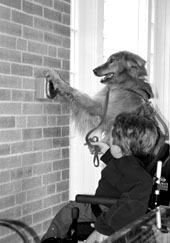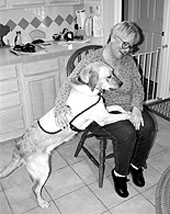People used to stare at Amanda Beaty because she was in a wheelchair. But now they stare at her companion, Nick. Nick is the 5-year-old Golden Retriever that works as Amanda's service dog on campus. The 75-pound dog pushes the elevator button for Amanda, takes off her backpack and pulls her around campus by a leash that Amanda holds."When I didn't have Nick, it was like they didn't see me," said Amanda, a junior news-editorial journalism major. "But with Nick, people come up and talk with us." Nick wears a red and blue backpack that carries his water bowl and leashes of varying lengths for Amanda to use. While wearing this pack, Nick is not to be touched or distracted by students in any way. At home, Nick will perform tasks such as turning light switches on and off, opening the refrigerator and picking up the phone by mouth for Amanda. "Sometimes he gets so excited to pick up the phone that he throws it around," she said. "And then I wonder what the person on the other line thinks." Amanda was born with the hormonal disorder McCune-Albright syndrome. By the time she was 8, the disease had gradually deteriorated her bones. It became too difficult for her to walk, and she began using a wheelchair. After graduating in 1996 from Cole High School in San Antonio, she sought assistance from the organization Paws With A Cause. Dog trainers there taught Nick 48 commands after they learned from an interview with Amanda what kind of dog she would need. Nick was trained specifically to pick up things that are too high or low for Amanda to reach.
Trisha Gailey is a "puppy raiser" from Plano who is training her first dog, Gabby, for another dog assistance organization, Canine Companions For Independence. Gailey began teaching Gabby at eight weeks, and when Gabby leaves at 14 months, the dog will know 30 preliminary commands. "When he leaves here, he can be taken any place and be calm and confident and well-behaved," Gailey said. After Gailey finishes with Gabby, the dog will travel to California, where he will receive advanced training at the national CCI headquarters. There, Gabby will learn to combine the preliminary commands Gailey taught him with more advanced ones. Gailey said people are more comfortable approaching a dog than approaching a disabled person alone. "These dogs make a huge difference in (disabled people's) lives," she said. "They provide the gift of independence. From the day (puppy raisers) get their dog, they know he's not theirs. They know he has a very special destiny." Amanda said the only problems she experiences on campus are when squirrels distract Nick, and he wants to chase them. Nick also knows the routes that Amanda must take to class every day. For instance, when she says "science," Nick knows to take Amanda to the Sid W. Richardson Building. Nick pulls Amanda through campus at about a jogger's pace. With Amanda's guidance, Nick weaves in and out of student groups and park benches before arriving at class, usually five minutes ahead of time. "The first time she came in class with the dog, I was, like, 'Hey, she doesn't know the rules (against bringing animals inside campus buildings),'" said Sanjana Singh, a graduate student in media studies. "But he does not distract from class. Nick is a very quiet and sober dog."
"You are compelled to look at Amanda and her dog because it is different," said Chris Frey, a junior political science major. "But it makes you proud that a TCU student is doing this." Lucas Aubrey, a sophomore political science major, also said he stared at Amanda the first time he saw her. "You see a dog and somebody in a wheelchair, and it makes you look twice," he said. Amanda said she chose to attend TCU because people were more willing to assist her. "(University representatives) showed me where the parking spaces were and the entrances with the wider doors," she said. "At other universities, you had to seek that help." Amanda commutes from Dallas every day in her 1998 Plymouth Grand Voyager. The van is equipped with an automatic sliding door and ramp that lowers her and Nick onto the ground at the push of a button. "Going to college is a lot different from high school," she said. "It is more spread out, and Mom and Dad are not there to help. With my personality, I would prefer to struggle than ask for help."
Steven Baker
By Jaime Walker staff reporter When Gregor Esch first came to TCU eight years ago, there was no elevator in Reed Hall. Getting to class required waking up 30 minutes early so he could get through the building's maze of hallways before class began. "It was the biggest inconvenience in the world," he said. "I hated going to that class because I had to go through the janitor's closet, into the conference room, and then through the heavy, glass double doors. No one else ever had to work so hard." Esch, a TCU alumnus who is now working toward his MBA, said he never let cerebral palsy, his wheelchair or a lack of accessibility get in the way of his dream of graduating with a bachelor's degree in journalism from TCU. "I was stubborn," he said. "I would have done anything to make it work because I loved the school. I think all of us in chairs feel the same way." Over the years, the university has worked to increase its compliance with the Americans with Disabilities Act of 1990, a federal law which prohibits discrimination on the basis of disability and requires that public areas be made accessible. TCU must follow ADA guidelines when buildings are designed, constructed or renovated, said Larry Garrison, the university architect. Curb cuts, accessible entrances and elevator access are all covered under the law. "We work very hard to see that our renovations meet the law," Garrison said. "When we do that, we usually find that our disabled students like them." Patrick Harris, a freshman graphic design major, said although the ADA has increased awareness about the need for disability access on campus, people are mistaken if they think the law works well in all cases. "I always have to go the scenic route," he said. "Just because there is a way for me to get to class doesn't mean it is at all convenient." Jennifer Lowrance, director of the Center for Academic Services, said TCU is very responsive to the needs of all of its students and takes special care to make sure that those with different forms of mobility can get around campus. "Every time one of our students on wheels brings us a concern, we do what we can to deal with it because we want them to have the best experience possible," she said. Esch and Harris both said one of the reasons they selected TCU was the fact that officials seemed willing to make campus improvements. "They do get things done," Harris said. "I understand that there are issues like budgets, but, really, accessibility is one of those things that is more than a matter of what's easiest. It allows us to live our lives here." Garrison said as TCU continues both its residence hall and academic building renovations, the campus will become even more compliant with ADA regulations. The university just completed its $1.5 million renovation of the Daniel-Meyer Coliseum to make restrooms and seating accessible, and designs to make Amon Carter Stadium more accessible are under review, he said. Esch said TCU has come a long way since the days when University Drive's lack of curb cuts made it impossible for him to use the sidewalks to get to class. "I have never done things the conventional way," he said. "But, I am a person just like everyone else. Just because I use four wheels instead of two legs does not make me any less human."
Jaime Walker |
| The TCU Daily Skiff © 1998, 1999 Credits |
 "Nick helps me make friends, too," she said. "People
are reluctant to come up to people in wheelchairs."
"Nick helps me make friends, too," she said. "People
are reluctant to come up to people in wheelchairs." In class, Nick will lie at Amanda's feet until students
begin to squirm in their seats and close their notebooks. Nick has learned
the signal that class is winding down.
In class, Nick will lie at Amanda's feet until students
begin to squirm in their seats and close their notebooks. Nick has learned
the signal that class is winding down.